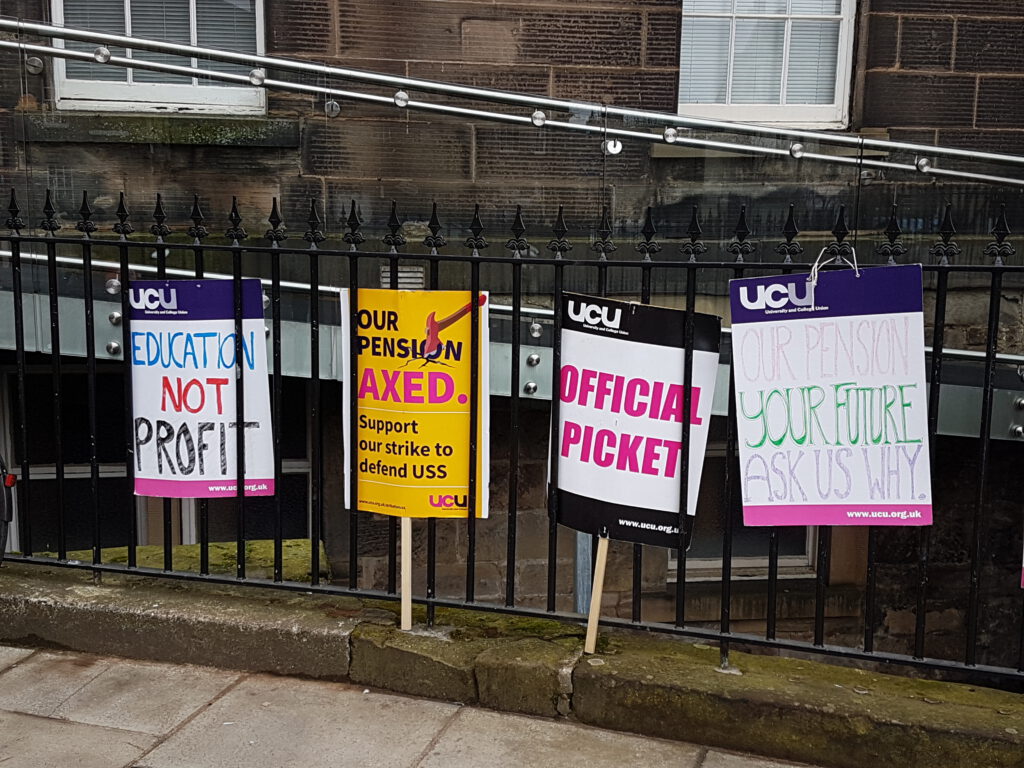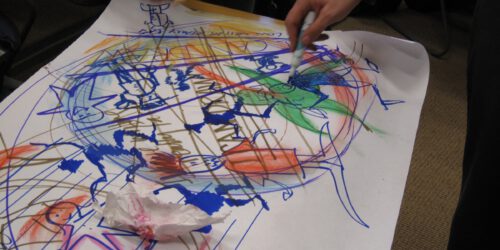Sustainable Academia: Marianna Dudley on university strike action in the age of climate change (Part 1)

This post is part of a series on Sustainable Academia—in cooperation with the Next Generation Action Team (NEXTGATe) of the European Society for Environmental History—in which contributors reflect on the conditions of historians in Europe and beyond (especially those in early career stages), introduce visions for the field, and suggest concrete action in order to build more inclusive and supportive academic environments.
On a gloomy January afternoon, Sam Grinsell and Elizabeth Hameeteman spoke with Dr. Marianna Dudley, a Senior Lecturer in Environmental Humanities at the University of Bristol and Vice President of the ESEH, about the ongoing strike action at universities across the UK. She candidly shared her take on being on the picket line as a member of the University and College Union (UCU) and how such collective action can also inform calls to action in response to the wider climate crisis. This is the first of a pair of posts on our conversation, read Part II here.
* * *
Right off the bat, we ask what exactly the main issues of the strike are. “Well,” Dudley starts off, “what might not be visible to people outside of UK academia is that this strike is about two separate issues–and both issues are being acted upon.” The first issue, in fact, consists of four related topics. For Dudley, these “Four Fights” very much speak to the idea of sustainable working practices within academia. “We’re striking on the gender, ethnicity, and disability pay gaps that exist within academia,” she explains, “and which never seem to go away.” Therefore, “we are demanding action to close those gaps.” Unsustainable work loads are also a topic of contention. As Dudley puts it, “it’s simply not possible to continue working at the rate we’re working at in terms of our health and in terms of our ability to do our jobs properly.”
Another reason to strike revolves around the topic of causualization within academia. In the UK, but also elsewhere, it has become built upon a system of exploiting casualized labor, Dudley explains. “That labor is done disproportionately by postgraduate students who themselves want to become academics–their expertise, their training is being taken advantage of by universities who refuse to give them reliable contracts.” In fact, as Dudley puts it, “this practice is actually becoming a central part to how universities operate.” The fourth fight relates to falling pay. In essence, UK-based academics have not seen real-term pay rises in the last twenty or so years. “This is a whole generation of academics whose pay has been steadily eroded,” Dudley says. “It’s strange to think that as a scholar who is not early career anymore, I have never had a pay raise in line with inflation since I started doing my job.”
Dudley links topics like fair pay, job security, manageable workloads, and equality to general working conditions and about the present state of higher education in the UK–”and they are really important, all of them.”
The other issue on which UK-based academics are striking centers on another critical problem for sustainable academia: pension schemes. Without wanting to go too deep into the entire academic pension system, Dudley briefly explains the issue at hand. “If you work at a British university, then you have to be part of one of two pension schemes, and the one that’s in real trouble is called the University Superannuation Scheme (USS),” since it chose to conduct its latest valuation amid crashing markets at the very beginning of the pandemic. Indeed, as Dudley puts it, “a time when the global economy completely, well, tanked.” Based on this “very distorted evaluation,” the USS decided that “our scheme was no longer viable, meaning we needed to have to pay more and take home less in terms of our pensions.” Dudley feels that this is “an existential issue for academia,” since academics already do not get paid that much in the first place. Indeed, this comes on top of the fact that “we’re already on strike about our pay cut.”
“One of the premises of academia is that you can have a long career, not get paid with what you get in the private sector using your skills and expertise, and that at the end of that career you can retire on a safe and decent pension,” Dudley maintains. “That’s the kind of deal that you make when you go into academia with your employer.” Yet by destroying the pension scheme, “they are taking away that promise and one of the incentives for people to even work in academia.” This has disastrous effects. Dudley herself, for instance, would be looking at a cut of about 40% in her pension when she retires. “It’s big,” she says, “and it impacts younger scholars even more.” In other words, “the less time you’ve been in your career, the more you lose in terms of your pension.” This means that striking against the crumbling pension scheme is “also about defending higher education for those people who are at the beginning of their careers now rather than the professors who are able to retire on a pretty healthy pension.”
Dudley stops there. “It’s complex,” she says, “but I think it does tell you a lot about the state of higher education overall that there are so many issues for which people are willing to take the pay cut, strike, and stop working in order to address.”
Indeed, Elizabeth responds, “it’s a very complex issue, but how you have laid out the reasons to strike are very clear and straightforward” [note: to learn more about the Four Fights and the USS disputes, go to the UCU website]. To move on from the specifics of the current strike action, Sam asks about Dudley’s take on how historical thought or practice might inform collective action within academia.
“That’s a good question as there are lots of different places you can take that,” Dudley replies, “not least the fact that a lot of historians work on the history of labor, protest, and radical thought.” In fact, “something that’s been interesting to see is who actually turns out to strike and who turns up on the picket line, sometimes it’s not those radical historians,” she says laughingly. “There’s a lot to be said about actually taking part in action, and being vocal and present.” For one, Dudley explains, “what we’ve seen in the strike is where more senior colleagues can really support younger staff who are bearing the brunt of some of the effects of casualization and so on is to speak out, be visible, and support their actions.”
“I think being a historian on strike makes you look for the precedents and think about this particular action in the context of a long line of protest and strike action as a way to collectively bargain for better conditions.” In the UK that’s certainly true, Dudley argues, where there’s “a long tradition of ground up, people-based protest movements that without which we would not have the kind of labor laws that protect all of us and make all of our working lives better through things like maternity leave and sick pay–as in, things that are even more crucial in a pandemic than ever before.” Such social benefits have, as she puts it, “never been given by employers, it has always required collective action in order to be negotiated and gained.”
In this round of strikes, Dudley explains, “historians have perhaps been even more acutely aware that we cannot rely on the words of our employers to reassure us that the steps they are taking are actually going to manifest into anything tangible.” In fact, the case in point is Dudley’s own employer. The mean gender pay gap at her university, for instance, amounts to 18.3 percent. “It’s huge,” and what is more disconcerting, “my employer proudly presents on its website that they managed to cut that by .3 percent in the last year.” At this rate, “they might close the gender pay gap in 22 years’ time, by which time most academics working now will be retired.”
“Employers are constantly telling us what they’re doing and reassuring us that they care about the issues and that they want to see change too but,” as Dudley sees it, “the pace of that change is not sufficient.” Indeed, “there’s a real urgency to these issues in the same way that there’s an urgency to climate action, relating to the fact that the kind of platitudes given by those in power just don’t match with the action we need to see taken.” In UK academia, there’s certainly “a sense that we need to be on strike in order to show our employers that we’re not backing down on these issues, we need to see that action before we go back to work properly.”
Therefore, Dudley purposefully proclaims, “we will be going on strike more and there will be more of us doing it as well, so it’s definitely not the end for this series of actions just yet.”






1 Response